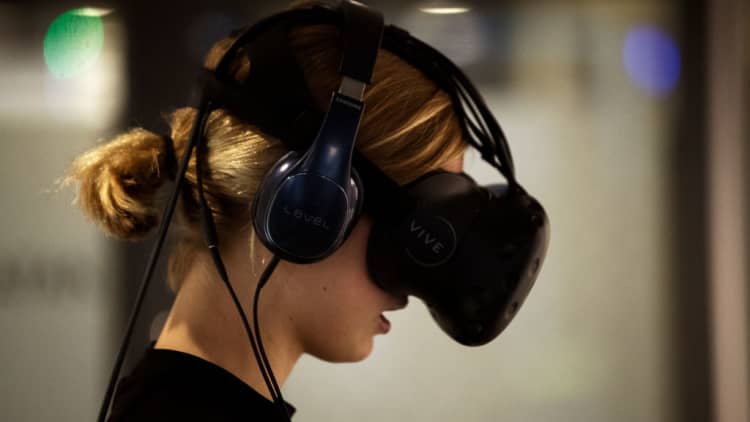
You might say Jesus Noland is living out a young gamer's dream.
He grew up with a love of computers and video games and at 30, has found a way to channel that passion into a career as a developer in virtual and augmented reality.
"The best thing about working in this field is being able to solve creative problems on a daily basis— it's a lot of fun, actually," he said.
Noland focuses on the technology application in education and energy at EON Reality in Irvine, California. EON designs applications to train workers in varying industries. For example, Exxon Mobil has used EON's immersive virtual reality platform to train operators and engineers in oil and gas production.
Virtual reality replaces your reality, whereas augmented reality bridges the gap between the physical and virtual worlds. Both industries are growing by leaps and bounds, meaning workers like Noland will be in demand for years to come. According to a recent report from the International Data Corp., worldwide revenues for the AR and VR market are forecast to increase by 100 percent or more over the next four years, with total spending set to hit some $215 billion by 2021. The U.S. is on pace to spend $3.2 billion on AR and VR this year alone, making it the largest market for this new technology.
The industry's growth is reflected in a small business like EON, which began in 1999 with two workers and grew to 90 by 2015. Today, it has nearly 250 employees and is looking to add 110 more in the next year as demand for VR and AR products increases.
"We look at people who have programming skills, that know how to build these sophisticated applications on one hand," said EON Reality founder Dan Lejerskar. "And on the other hand, we are looking at people that know modeling and know how to create these sophisticated 3-D environments."
Starting salaries for VR and AR workers range from $60,000 to $80,000 a year but vary by industry and role. But finding workers with these skills can be challenging because the industry is still in its early stages. EON has teamed with several colleges nationwide, including Lehman College in the Bronx, New York, to offer training programs to bring new or hopeful VR and AR workers up to speed. "We hope that as we do this ourselves, that universities will pick up the curriculum to start expanding this new workforce," Lejerskar said.
Tina Cheng is part of the inaugural class of 20 students at Lehman's Augmented and Virtual Reality Training program, which lasts 11 months and costs under $600. After prior work in broadcasting and architecture, Cheng took a career break. When she returned to the workforce, she decided to change direction and pursue a new career in VR and AR. Her coursework includes coding, animation, 3-D graphics and web design. She and her classmates are working on creating tutorials in virtual reality.
"I found this opportunity to re-educate myself," Cheng said. "I think the opportunities for augmented and virtual reality are huge. It takes a lot of creativity, and understanding of how you can take this new technology and benefit existing industries."
But these skills are also able to be taught, program administrators insist, adding that prior experience in coding or web design isn't necessary for success. Lehman is also working with New York City to open a training center at the Brooklyn Navy Yard to enable more students to pursue oppounities.
"There's a tremendous opportunity for people who are entrepreneurial, and for people who have a sense of the future to participate," said Ronald Bergmann, Lehman College CUNY vice president of Information technology and chief information officer. "Really the most important thing is passion and creativity, because you could learn these skills."
Noland, for one, channels that entrepreneurial spirit and is glad to be at the forefront of a growing industry at EON.
"The VR and AR industry is really young, and so there's a great potential for new applications that need to be built by content creators," he said.





